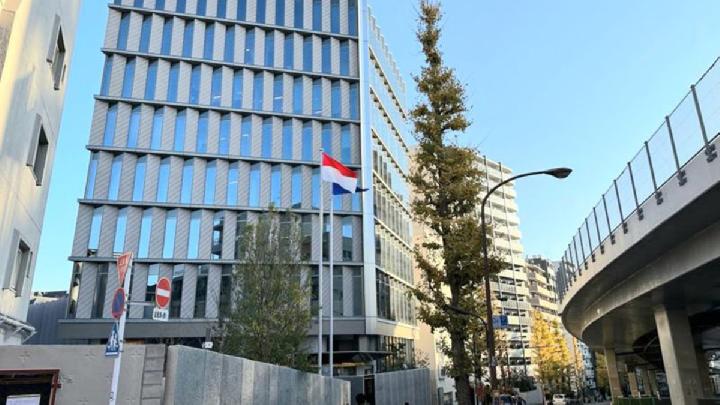Their navy Ralph Lauren blazers, blue pinstriped shirts, and crisp white slacks or skirts made them the most stylish officials in sport. But when the All England Club opens its gates on Monday, the courts will be devoid of the fashionable figures who had long patrolled the perimeter – the line judges.
Welcome to Wimbledon in the AI age, where tradition has yielded to technology and man has made way for machine.
After 147 years of humans calling the shots, a computer will now rule on whether the ball is in or out. Calls will be delivered via a recorded voice, while the challenge system - which prompted that clap and those gasps from a captivated crowd - has been rendered redundant.
'It will be a more sterile environment and experience,' admits Ivan Milatović, a 51-year-old London-based Serbian solicitor who worked as a line judge at Wimbledon for 10 years. 'It'll be slicker and quicker, but less fun for the audience. Some of the drama will be lost.
'Ralph Lauren will definitely be regretting us not being there because we were essentially nice advertising boardings for them!'
It was last October when Wimbledon announced its decision to replace line judges – officially 'line umpires' - with electronic line calling (ELC).
The iconic Wimbledon line judges will make way for technology in a controversial change
After 147 years of humans calling the shots, a computer will now rule on whether the ball is in
The courts will now be devoid of the fashionable figures who had long patrolled the perimeter
'The time is right for us to move on,' declared the Championships' chief executive Sally Bolton, who had seen the Australian Open implement the system in 2021, then the US Open the following year.
For those directly impacted, the news did not come as a surprise. 'It was more disappointment than shock,' admits 39-year-old Rob Hodge, who officiated at Wimbledon 13 times and was selected for the 2023 men's final.
'When the ATP announced that from 2025 all their tournaments were going to have electronic line calling, the writing was on the wall. It's just the way of the world now. Technology is taking over everywhere.'
Malgorzata Grzyb, chair of the Association of British Tennis Officials (ABTO), adds: 'We were always hoping it would come as late as possible, that we'd get an extra year then an extra year, because there's the tradition and for every official it's the highlight of their officiating calendar.
'To no longer have that is sad, but we all saw this coming for some years now. As more and more events adopted ELC, it was inevitable that it was going to come to Wimbledon.'
The ELC system was created by Hawk-Eye, the company responsible for the challenge system which was introduced at Wimbledon in 2007. Also known as Hawk-Eye Live, it was first used at the ATP Next Gen Finals in Milan in 2018, then adopted more widely during the Covid-19 pandemic in 2020.
It uses 18 cameras set up around the court to track the trajectory of the ball, with a computer processing its location in real time. A video operator oversees the technology away from the court, but automated calls of 'out' and 'fault' are triggered within a tenth of a second of the ball landing and broadcast via courtside speakers.
For the calls, Wimbledon will use the recorded voices of All England Club staff, including tour guides. Only one voice will be heard on each match, but different courts will have different voices to avoid confusion. At this year's Australian Open, British No3 Sonay Kartal was stopped in her tracks after serving and hearing 'out', but the call had come from an adjacent court and she lost the point.
The Hawk-Eye Live system has been used on the tour for a number of years
Around 300 line judges were previously used each year, with nine on court at any one time
Generally, though, ELC has proved popular with players. 'They prefer it because there are no controversies,' says Milatović, who reached the final of BBC's Mastermind this year. 'A machine makes the decision, they accept it and they move on. It doesn't break their rhythm because they won't be stopping to challenge or have discussions with the umpire.'
Around 300 line judges were previously used at Wimbledon each year, with nine on court at any one time. They could earn up to £200 a day, plus expenses. But it was never about the money for the men and women who took a fortnight off from their day jobs for the honour of working at SW19.
'I will never ever forget the feeling I had when I stepped on to court for the first time in 2011,' recalls Hodge, who is a tennis coach in York. 'It was a real pinch-yourself moment. You are waiting to wake up, thinking you are in a dream.
'When you go on to Centre Court for the first time, that is a nerve-wracking experience. You go through every emotion under the sun. Of course, some of the biggest mistakes I've ever made have come on the most important courts. But if you are going to screw up, you may as well screw up in style!'
While Hodge and Milatović will watch this year's Wimbledon from afar rather than their usual courtside seat, around 80 line judges have been retained in newly-created 'match assistant' roles.
Two assistants will be assigned to each court and will sit behind the umpire's chair, overseeing ball changes and accompanying players on toilet breaks.
But Milatović says: 'I've done a couple of days of match assisting and it's a very limited function. You're not officiating in any sense of the word. It didn't match up to the demands of being a line umpire. It is just not the same feeling of accomplishment.
'Officiating is a special mental state, where you're kind of really locked in on one task with no distractions. It's super intense. You couldn't live like that. Your brain would melt!'
One former line judge warned the change would lead to a 'sterile' environment (pictured: Steffi Graf chats to a line judge over a contested call during a math on Centre Court in May 2009)
Around 80 line judges have been retained in newly-created 'match assistant' roles
Wimbledon, though, have largely hired match assistants so they have trained line judges on standby should the technology fail. 'You always need to have a back-up,' says Grzyb.
Such a scenario, though, is extremely unlikely. And there are concerns about how Wimbledon's move to ELC will impact the LTA's ability to recruit officials for lesser events which do not use the system.
'You worry about the smaller tournaments,' admits Hodge, who has not renewed his officials' licence this year. 'Aside from Wimbledon, you always had to put in a certain number of days at other tournaments to get your days in to keep your grade.
'Going to those tournaments, you always had the carrot of Wimbledon. But now Wimbledon is not there anymore, it's kind of like, "What's the point?".'
Milatović, who officiated at the Nottingham Open earlier this month, adds: 'I think it's a huge crisis. We are seeing repeated emails from the LTA asking for the availability of officials because people are signing up less.
'I suspect a lot of people will either severely curtail their tennis or will stop altogether. They are going to struggle to recruit people. They might have to pay more to make people interested.'
Grzyb is more positive, pointing out that countries without a Grand Slam do not struggle to find officials. However, her organisation has moved to ensure it does not lose the next generation of chair umpires by making it quicker to qualify.
'Previously you'd do a course to be a line umpire, you'd be a line umpire for a bit of time and then you'd do a course to be a chair umpire,' explains Grzyb.
Calls will be delivered via a recorded voice, while the challenge system is redundant
There are growing concerns that the role of the chair umpire may also soon become obsolete
'Now the first course you do is for chair umpire and line umpiring at the same time, so we are getting people on to the chair umpiring pathway. We'd changed that in anticipation of what was going to happen.'
There are growing concerns, however, that the role of the chair umpire may also soon become obsolete.
'With the pace of technological change that we're living through, in five to 10 years' time, I very much suspect there will be no chair umpires on the court,' adds Milatović. 'That's my gut feeling.
'There's really very little for them to do if players are not getting into disciplinary trouble. And the absence of contested line calls makes disciplinary trouble less likely. I think chair umpiring is endangered.'
You cannot be serious? Milatović and his immaculate mates have a history of making the right call.

 3 months ago
46
3 months ago
46

















































